(ii) Determine whether your decision in (b)(i) would change if you were to use the Maximin and Minimaxregret decision criteria. Your answer should be supported by relevant workings. (6 marks)
题目
(ii) Determine whether your decision in (b)(i) would change if you were to use the Maximin and Minimax
regret decision criteria. Your answer should be supported by relevant workings. (6 marks)
相似考题
参考答案和解析
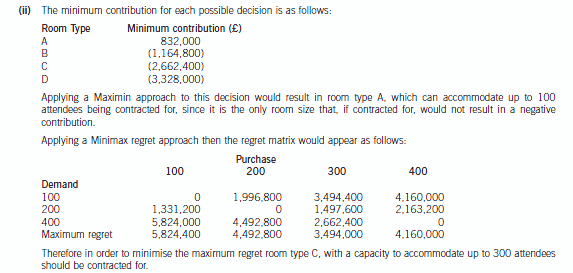
更多“(ii) Determine whether your decision in (b)(i) would change if you were to use the Maximin and Minimaxregret decision criteria. Your answer should be supported by relevant workings. (6 marks)”相关问题
-
第1题:
(b) Comment (with relevant calculations) on the performance of the business of Quicklink Ltd and Celer
Transport during the year ended 31 May 2005 and, insofar as the information permits, its projected
performance for the year ending 31 May 2006. Your answer should specifically consider:
(i) Revenue generation per vehicle
(ii) Vehicle utilisation and delivery mix
(iii) Service quality. (14 marks)
正确答案: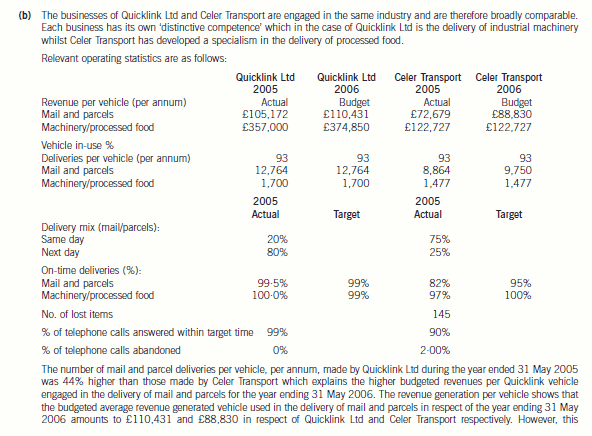
difference will reduce in the year ending 31 May 2006 due to the projected growth in sales volumes of the Celer Transport
business. The average mail/parcels delivery of mail/parcels per vehicle of the Quicklink Ltd part of the business is budgeted
at 12,764 which is still 30·91% higher than that of the Celer Transport business.
As far as specialist activities are concerned, Quicklink Ltd is budgeted to generate average revenues per vehicle amounting to
£374,850 whilst Celer Transport is budgeted to earn an average of £122,727 from each of the vehicles engaged in delivery
of processed food. It is noticeable that all contracts with major food producers were renewed on 1 June 2005 and it would
appear that there were no increases in the annual value of the contracts with major food producers. This might have been
the result of a strategic decision by the management of the combined entity in order to secure the future of this part of the
business which had been built up previously by the management of Celer Transport.
Each vehicle owned by Quicklink Ltd and Celer Transport is in use for 340 days during each year, which based on a
365 day year would give an in use % of 93%. This appears acceptable given the need for routine maintenance and repairs
due to wear and tear.
During the year ended 31 May 2005 the number of on-time deliveries of mail and parcel and industrial machinery deliveries
were 99·5% and 100% respectively. This compares with ratios of 82% and 97% in respect of mail and parcel and processed
food deliveries made by Celer Transport. In this critical area it is worth noting that Quicklink Ltd achieved their higher on-time
delivery target of 99% in respect of each activity whereas Celer Transport were unable to do so. Moreover, it is worth noting
that Celer Transport missed their target time for delivery of food products on 975 occasions throughout the year 31 May 2005
and this might well cause a high level of customer dissatisfaction and even result in lost business.
It is interesting to note that whilst the businesses operate in the same industry they have a rather different delivery mix in
terms of same day/next day demands by clients. Same day deliveries only comprise 20% of the business of Quicklink Ltd
whereas they comprise 75% of the business of Celer Transport. This may explain why the delivery performance of Celer
Transport with regard to mail and parcel deliveries was not as good as that of Quicklink Ltd.
The fact that 120 items of mail and 25 parcels were lost by the Celer Transport business is most disturbing and could prove
damaging as the safe delivery of such items is the very substance of the business and would almost certainly have resulted
in a loss of customer goodwill. This is an issue which must be addressed as a matter of urgency.
The introduction of the call management system by Quicklink Ltd on 1 June 2004 is now proving its worth with 99% of calls
answered within the target time of 20 seconds. This compares favourably with the Celer Transport business in which only
90% of a much smaller volume of calls were answered within a longer target time of 30 seconds. Future performance in this
area will improve if the call management system is applied to the Celer Transport business. In particular, it is likely that the
number of abandoned calls will be reduced and enhance the ‘image’ of the Celer Transport business.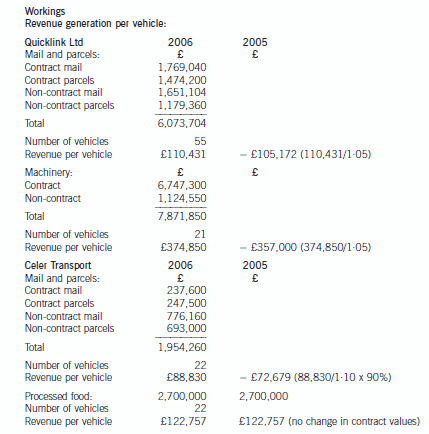

-
第2题:
(b) Determine whether your decision in (a) would change if you were to use each of the Maximin and Minimax
regret decision criteria.
Your answer should be supported by relevant workings. (6 marks)
正确答案: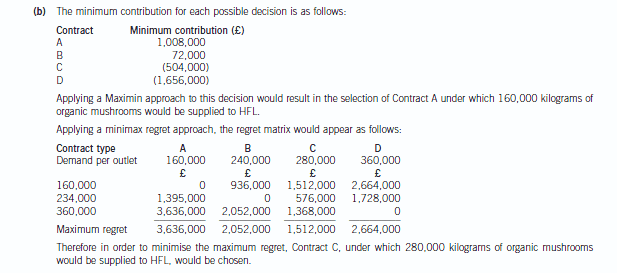
-
第3题:
(ii) Compute the annual income tax saving from your recommendation in (i) above as compared with the
situation where Cindy retains both the property and the shares. Identify any other tax implications
arising from your recommendation. Your answer should consider all relevant taxes. (3 marks)
正确答案: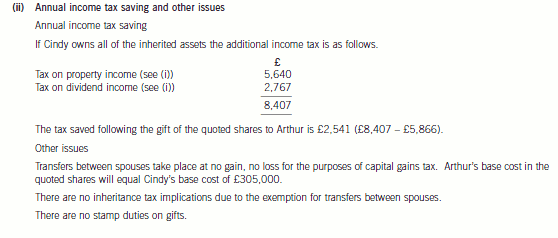
-
第4题:
(b) (i) Explain the matters you should consider to determine whether capitalised development costs are
appropriately recognised; and (5 marks)
正确答案:
(b) (i) Materiality
The net book value of capitalised development costs represent 7% of total assets in 2007 (2006 – 7·7%), and is
therefore material. The net book value has increased by 13%, a significant trend.
The costs capitalised during the year amount to $750,000. If it was found that the development cost had been
inappropriately capitalised, the cost should instead have been expensed. This would reduce profit before tax by
$750,000, representing 42% of the year’s profit. This is highly material. It is therefore essential to gather sufficient
evidence to support the assertion that development costs should be recognised as an asset.
In 2007, $750,000 capitalised development costs have been incurred, when added to $160,000 research costs
expensed, total research and development costs are $910,000 which represents 20·2% of total revenue, again
indicating a high level of materiality for this class of transaction.
Relevant accounting standard
Development costs should only be capitalised as an intangible asset if the recognition criteria of IAS 38 Intangible Assets
have been demonstrated in full:
– Intention to complete the intangible asset and use or sell it
– Technical feasibility and ability to use or sell
– Ability to generate future economic benefit
– Availability of technical, financial and other resources to complete
– Ability to measure the expenditure attributable to the intangible asset.
Research costs must be expensed, as should development costs which do not comply with the above criteria. The
auditors must consider how Sci-Tech Co differentiates between research and development costs.
There is risk that not all of the criteria have been demonstrated, especially due to the subjective nature of the
development itself:
– Pharmaceutical development is highly regulated. If the government does not license the product then the product
cannot be sold, and economic benefits will therefore not be received.
– Market research should justify the commercial viability of the product. The launch of a rival product to Flortex
means that market share is likely to be much lower than anticipated, and the ability to sell Flortex is reduced. This
could mean that Flortex will not generate an overall economic benefit if future sales will not recover the research
and development costs already suffered, and yet to be suffered, prior to launch. The existence of the rival product
could indicate that Flortex is no longer commercially viable, in which case the capitalised development costs
relating to Flortex should be immediately expensed.
– The funding on which development is dependent may be withdrawn, indicating that there are not adequate
resources to complete the development of the products. Sci-Tech has failed to meet one of its required key
performance indicators (KPI) in the year ended 30 November 2007, as products valued at 0·8% revenue have
been donated to charity, whereas the required KPI is 1% revenue.
Given that there is currently a breach of the target KPIs, this is likely to result in funding equivalent to 25% of
research and development expenditure being withdrawn. If Sci-Tech Co is unable to source alternative means of
finance, then it would seem that adequate resources may not be available to complete the development of new
products. -
第5题:
Part A
51. Directions:
You are preparing to ask for some help from your teacher, write a letter that:
1) detail what you want him or she does for you,
2) express your thanks to your teacher,
You should write about i00 words on ANSWER SHEET II. Do not sign your own name at the end of the letter. You do not need to write the address.
正确答案:
[参考范文]
Dear Ms Wang,
I make bold to write this letter to ask you to do me a favor. I have tried to translate several short Chinese stories into English for a part-time job. As it is the first time for me to do a translation work, I think there must be many errors and awkward expressions of Chinese English for my lack of experiences. I sincerely hope that you would read over my manuscripts and correct my mistakes and socialisms. Also could you please give me some other suggestions on my translation work.
Thank you for your help with great respect!
Your faithful student,
×××
-
第6题:
When you notice oil on the water near your vessel while taking on fuel, you should FIRST ______.
A.stop loading
B.notify the senior deck officer
C.notify the terminal superintendent
D.determine whether your vessel is the source
正确答案:A
-
第7题:
You have borrowed a book from Professor Thomas and find that you can't give it back to him two days later as scheduled.Write him an email to ask whether you can keep the book for a few days more and make an apology.You should write about 100 words neatly on the ANSWER SHEET.Do not use your own name at the end of the email.Use"Ii Ming"instead.(10 points)答案:解析:Dear Professor Thomas,I appreciate that you have lent me one of your precious books.I am writing to ask whether I could keep it for a few days more,and to make a sincere apology for the delay.For a deeper understanding of it,I have been consulting so large amounts of reference sources that it takes much more time than expected,and now it seems impossible for me to finish it as scheduled.Moreover,it is not yet available in China whereas it's one of the important reference documents for my paper.For these reasons,I want to ask if I could have your permission to.return it two weeks later.Looking forward to your reply.Yours sincerety,Li Ming -
第8题:
Directions:Suppose you are a librarian in your university.Write a notice of about 100 words,providing the newly-enrolled international students with relevant information about the library.You should write neatly on the ANSWER SHEET.Do not sign your own name at the end of the notice.Use“LI Ming”instead.Do not write the address.答案:解析:Notice For better serving the international students,a notice is released here to provide the necessary information about the library.The university library opens at 8 a.m.and closes at 10 p.m.from Monday to Friday,but from 9 a.m.to 9 p.m.on -
第9题:
( )You want to apply for the position of a teaching assistant for a particular course,write a letter to Professor Stevens to(1)show your interest(2)describe yourself,and(3)explain why you would be suitable for the job You should include the details you think necessary You should write neatly on the ANSWER SHEE/Do not sign your own name at the end of the letter.Use"Li Ming"instead答案:解析:Dear Professor Stevens I am writing to apply for the position of teaching assistance for the course Creative Writing and Literature"at Peking University I am currently a junior in Literature in Peking University.Since my second year,I have worked as a teaching assistant for the course"American Literature".I have also received multiple awards for excellence in writing,including a national Endowment for the Arts grant in Beijing.I am passionate about writing and the teaching of writing,and I look forward to the opportunity to share those passions with you and the students MycvisattachedIcanbereachedat1364-0006orliming@email.com,and I am available to interview at your convenience.I look forward to meeting you,and thank you for the opportunity to be considered for the post of the teaching assistant Sicerely,Li Ming -
第10题:
Write a letter to Mr Green to apply for a job.In the lelter,you should 1)show your interest,2)describe your previous experience,and 3)explain why you would be suitable for the job.You should write about 100 words neatly on the ANSWER SHEET.Do not sign your own name.Use"Li Ming"instead.Do not write your address.答案:解析:Dear MrGreen,
I am writing to apply for the programmer position advertised in the China Daily.As requested,I have enlosed a completed job application,my certification,my resume,and three references.I believe that my strong technical experience and education will make me a very competitive candidate for this position.With a BS degree in Computer Programming,I have a full understanding of the full lifecycle of a software development project.I also have experience in learning and exceUing at new technologies as needed.Please see my resume for additional information on my experience.I can be reached anytime via emailing to liming@163.com or dialing my cell phone number 138-XXXX-XXXX.Thank you for your time and consideration.I look forward to speaking with you about this position.
Sincerely,
Li Ming -
第11题:
I don’t mind()the decision,anyway it’s a big order.
- A、your delaying making
- B、you todelay making
- C、your delaying to make
- D、you delay to make
正确答案:A -
第12题:
问答题Directions: You will graduate from university and are hunting for a job. After reading a job ads, write a letter to the Personnel Resources Department to (1)state your reason to write the application, (2)describe your relevant education background, (3)introduce your English level, and (4)state your way of contact. You should write about 100 words neatly on the ANSWER SHEET. Do not sign your own name. Use “Li Ming” instead. You do not need to write the address.正确答案:
Dear Sir/Madam,
①I am responding to your adin the June 20th, 2012,issue of the Sunday Talent Journal for the position of production coordinator. ②I feel that my background inelectronics and manufacturingwill fit in well.
③I will graduate from collegein June with a Bachelor of Science degree in Manufacturing Engineering. ④I have had extensive trainingon computers and well-trained while at school. ⑤In my Production Class, I have learnedabout computerized production and material scheduling.
⑥I can also express myself effectively in both spoken and written English.⑦Besides you will find me hard-working, cooperative and innovative. ⑧I am looking forward tohearing from you. ⑨I can be reached at my resume address or by phoning (010) 23577980.
Sincerely Yours,
Li Ming解析:
①②简述招聘信息的来源、所申请职位和缘由
③④⑤介绍自己的学习背景
⑥⑦介绍自己的特长
⑧希望得到面试机会
⑨告知对方联系方式 -
第13题:
(ii) Recommend which of the refrigeration systems should be purchased. You should state your reasons
which must be supported by relevant calculations. (3 marks)
正确答案:
-
第14题:
(b) Explain the capital gains tax (CGT) and inheritance tax (IHT) implications of Graeme gifting his remaining ‘T’
ordinary shares at their current value either:
(i) to his wife, Catherine; or
(ii) to his son, Barry.
Your answer should be supported by relevant calculations and clearly identify the availability and effect of
any reliefs (other than the CGT annual exemption) that might be used to reduce or defer any tax liabilities
arising. (9 marks)
正确答案: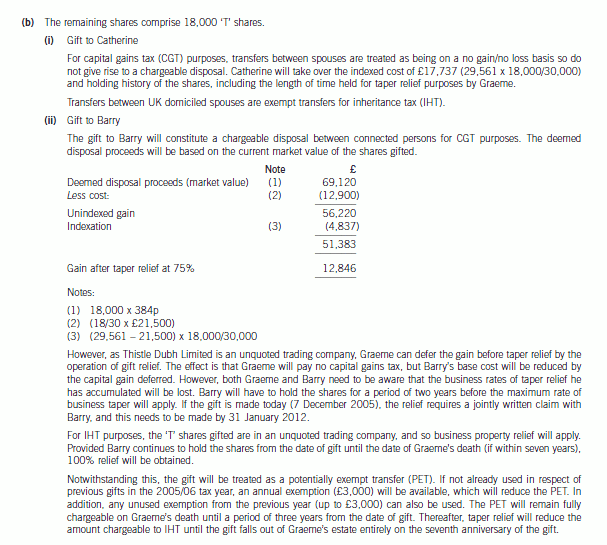
-
第15题:
(iii) State how your answer in (ii) would differ if the sale were to be delayed until August 2006. (3 marks)
正确答案:
-
第16题:
It has()to change your life with sound decision.
A.potential
B.possible
C.probable
D.continental
参考答案:A
-
第17题:
I don‘t mind _______ the decision as long as it is not too late. A. you to delay making B. your delaying making C. your delaying to make D. you delay to make
正确答案:B
-
第18题:
Write a letter to Mr green to apply for a job.In the ne letter,you shoul(1)show your interest(2)describe your previous experience,and(3)explain why you would be suitable for the job You should write about 100 words neatly on the ANSWER SHEET.Do not sign your own name.Use"Li Ming"instead Do not write your address.(10 points)答案:解析:Dear MrGreen I am writing to apply for the programmer position advertised in the China Daily.As requested I have enlosed a completed job application,my certification,my resume,and three references I believe that my strong technical experience and education will make me a very competitive candidate for this position.With a BS degree in Computer Programming,I have a full understanding of the full lifecycle of a software development project i also have experience in learning and excelling at new technologies as needed Please see my resume for additional information on my experience canbereachedanytimeviaemailingtoliming@163.comordialingmycellphonenumber 138-XXXX-XXXX.Thank you for your time and consideration.I look forward to speaking with you about this position Sincere Li Ming -
第19题:
Write an email to the freshmen in your department to recommend a book club.In your email you should include the details you think necessary.You should write about 100 words neatly on the ANSWER SFIEET.Do not use your own name at the end of the email.Use"Ii Ming"instead.(10 points)答案:解析:Dear Stuclents.I president of Yanjing Reading Club,am writing to recommend our reading club to you,and invite those who are interested in studies or Guoxue to join us.Yanjing Reading Club,targeting alt students in our school,aims to carry on and promote Chinese classics and wisdom.The reading of classics,hosted by teachers from the Department of Philosophy,is organized every Friday at 7 p.m.in Room 503,No.2 Teaching Building.In addition,there will be regular lectures on Guoxue given by famous experts and scholars.Join us,and you will get the chance to Iislen to masters and talk with like-minded people!I'm sure you will benefit a lot from it.Looking forward to having you join us!Faithfully yours,Li Ming -
第20题:
Recently.many citizens try to use the facilities in your university due to a shortage of public sports facilities in your city.Write a letter of aboui 100 words on this issue to the city department concerned to l)give your opinions briefly,and 2)make two or three suggestions.You should write neatly on the ANSWER SHEET.Do not use your own name at the end of the letter.Use"Ii Ming"instead Do not write the acldress.(10 points)答案:解析:Dear Sir or Madam,I am a student of xx University.I'm writing to express my humble opinions about the pubtic sports facilities in our city.In recent years,the population has grown rapidly,so has citizens'passion for bodybuilding,while on the other hand,newly-built communities seriously lack public sports facilities and many existing facilities are in bad conditions.As a consequence,citizens often get into campuses to use sports facilities there without permission,which poses risks to campus security.I suggest that the government allocate more financing to the maintenance and construction of public sports facilities.Besides,opening sports faciIJties on campus in an orderly manner may also be helpful.For example,allow citizens to use those facilities during weekends and holidays by appointment.Thank you for your time and I hope you will find the above suggestions useful.Yours faithfully,Li Ming -
第21题:
Directions:Suppose you borrow a book from your friend,but unfortunately it is lost.Write an email to apologize.You should write about 100 words on the ANSWER SHEET.Do not use your own name,Use"Li Ming"instead.Do not write your address.答案:解析:Dear Bob,
This is Li Ming.I am writing to express my apology because I lost the book you lent mc last week.Last week,while I was reading in the library,I answered an emergency call and hurried to deal with an important matter.I was in such a hurry that I forgot to bring the book,and it had disappeared when I came back.It is my carelessness that resulted in such a situation.Therefore,I am willing to shoulder the responsibility.I decide to buy a new one as compensation,but I wonder whether it is acceptable to you.Please don't hesitate to tell me if you have better solutions,1 am willing to cooperate.I apologise again for the inconvenience I may bring.It would be highly appreciated should you take my letter into serious consideration.I am looking forward to your reply.
Yours sincerely,
Li Ming -
第22题:
I don′t mind ______ the decision as longas it is not too late.A.you to delay making
B.your delaying making
C.your delaying to make
D.you delay to make答案:B解析:考查动名词作宾语。句意为“只要不是太晚,我不介意你延期做决定”。mind和delay两个词后面跟动名词作宾语。mind sb./sb.’s doingsth.“介意某人做某事”,delay doing sth.“延迟做某事”。故选B。 -
第23题:
问答题Practice 11 ● Read this part of a letter from John Biggs, who is the president of a business club. As President of the Clifton Business Club, I would like to invite you to speak at our annual dinner on 5 July. The dinner which starts at 7.30 pm, will be held at the Mayflower Restaurant, Clifton. I hope that you are able to accept the invitation and would be grateful if you could give me the subject of your talk, so that I can include it on the invitations to our members. I look forward to receiving your reply as soon as possible. ● Write a letter to Mr. Biggs: ● accepting the invitation ● telling him the subject of your talk ● asking how long the talk should be ● enquiring whether accommodation will be arranged for you. ● Write 60-80 words on your Answer Sheet. ● Do not include postal addresses.正确答案: 【参考范文】
Dear Mr. Biggs:
Thank you for your letter and I am writing to accept your invitation. The topic I am going to talk about is the new economy. I would like to know how long the talk will last, in order that I can prepare it.
In view of accommodation, I would be very grateful if you could help me with booking.
Thank you for your invitation again.
I look forward to seeing you soon.
Yours sincerely
Celia Silva解析: 暂无解析
